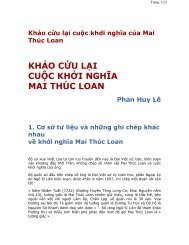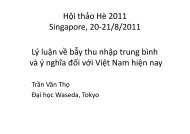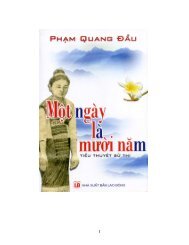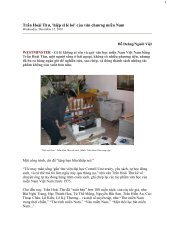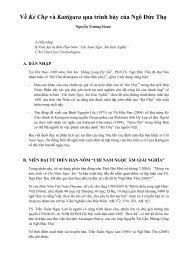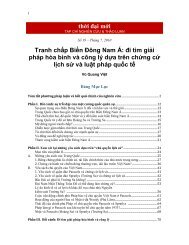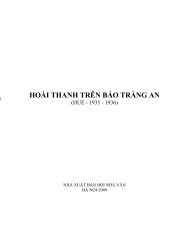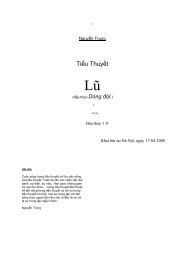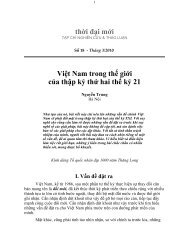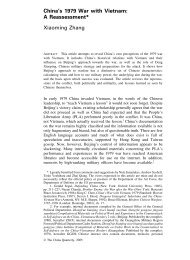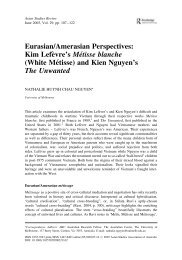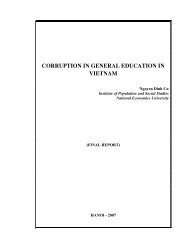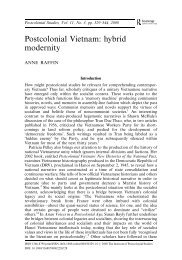John T. McNaughton and Vietnam: The Early Years as ... - Viet-studies
John T. McNaughton and Vietnam: The Early Years as ... - Viet-studies
John T. McNaughton and Vietnam: The Early Years as ... - Viet-studies
Create successful ePaper yourself
Turn your PDF publications into a flip-book with our unique Google optimized e-Paper software.
BENJAMIN T. HARRISON AND CHRISTOPHER L. MOSHER 505<br />
made it more difficult to pull out. <strong>The</strong> good doctor w<strong>as</strong> ready to pull the<br />
plug in 1964 because of the impossibility of keeping South <strong><strong>Viet</strong>nam</strong> noncommunist.<br />
December 1964 would be the first occ<strong>as</strong>ion, <strong>McNaughton</strong><br />
later wrote, on which he presented his c<strong>as</strong>e for getting the United States<br />
out of <strong><strong>Viet</strong>nam</strong>. He knew full well that failure in <strong><strong>Viet</strong>nam</strong> could destroy<br />
McNamara’s career <strong>and</strong> ‘would prevent LBJ’s reelection’. Even so, he<br />
still opposed America’s presence in <strong><strong>Viet</strong>nam</strong>. Officials of the Saigon<br />
government were making ‘public <strong>as</strong>ses of themselves’ <strong>and</strong> the <strong>as</strong>sistant<br />
defense secretary w<strong>as</strong> convinced the time had come to give up on the<br />
patient. In 1966, he wrote that he made two more futile attempts to get<br />
the United States to withdraw from <strong><strong>Viet</strong>nam</strong>. 48 Actually, he had tried to<br />
do this on numerous occ<strong>as</strong>ions. Between 1964 <strong>and</strong> 1966, he wrote memo<br />
after memo remarking on the illegitimate nature of the South <strong><strong>Viet</strong>nam</strong>ese<br />
government’s existence.<br />
In January 1965, for example, <strong>McNaughton</strong> wrote to McNamara that<br />
South <strong><strong>Viet</strong>nam</strong> w<strong>as</strong> being ‘lost’ <strong>and</strong> he expected a government to emerge<br />
that w<strong>as</strong> ‘not unfriendly to the DRV [Democratic Republic of <strong><strong>Viet</strong>nam</strong>]’.<br />
Consequently, he did not agree with requests from the JCS for incre<strong>as</strong>ed<br />
‘support troops’ because it would be trying to salvage a hopeless situation. 49<br />
He reiterated this theme at the end of the month telling McNamara that<br />
the incompetence of the Saigon government could give the United States<br />
an excuse to ‘dump’ the GVN. <strong>McNaughton</strong> urged that the United<br />
States ‘continue vigorous advisory efforts, but add no more U.S. men’.<br />
<strong>The</strong> narrators of the Gravel edition of the Pentagon Papers have noted<br />
that on the same date McNamara ‘seemed a good deal less dubious<br />
than w<strong>as</strong> <strong>McNaughton</strong> about the potential benefits to be derived from<br />
initiating air strikes against the DRV’. 50 In fact, <strong>McNaughton</strong> opposed<br />
any further escalation of American commitments in <strong><strong>Viet</strong>nam</strong>. <strong>The</strong> Saigon<br />
government did not have the support of the people <strong>and</strong> the bombing had<br />
not changed anything. His old mentor at Harvard, Professor Thom<strong>as</strong><br />
Schelling, had convinced <strong>McNaughton</strong> that if bombing did not succeed<br />
within the first three weeks, it w<strong>as</strong> a hopeless strategy. 51 US Army General<br />
Westmorel<strong>and</strong> w<strong>as</strong> furious with <strong>McNaughton</strong> because of his negative<br />
attitude towards bombing, referring sarc<strong>as</strong>tically to <strong>McNaughton</strong> <strong>as</strong><br />
part of the ‘superior Ivy League intellectuals’. 52 That year <strong>McNaughton</strong><br />
even opposed sending military <strong>as</strong>sistance to Latin America. 53 So military<br />
leaders <strong>and</strong> <strong>McNaughton</strong> were strange bedfellows indeed!<br />
An interesting memor<strong>and</strong>um exists in <strong>McNaughton</strong>’s private 1965<br />
files, undated <strong>and</strong> unsigned, <strong>and</strong> titled ‘Probable Reactions to the Cutting<br />
48 <strong>McNaughton</strong> Diary, 18 Oct. 1966, p. 1116 [sic] 117, Alex <strong>McNaughton</strong>’s Files. <strong>The</strong>re is a typo<br />
on the journal’s page number: it is p. 116 not 1116.<br />
49 GPP, iii. 683, ‘Observations Re South <strong><strong>Viet</strong>nam</strong>’, 4 Jan. 1965.<br />
50 Ibid., iii. 297, 686–7.<br />
51 Fred Kaplan, Wizards of Armageddon (New York, 1983), pp. 333–6.<br />
52 William Westmorel<strong>and</strong>, A Soldier Reports (New York, 1976) [hereafter Westmorel<strong>and</strong>, A Soldier<br />
Reports], p. 100.<br />
53 Stephen G. Rabe, <strong>The</strong> Most Dangerous Area in the World (Chapel Hill, NC, 1999), p. 145.<br />
© 2007 <strong>The</strong> Authors. Journal compilation © 2007 <strong>The</strong> Historical Association <strong>and</strong> Blackwell Publishing.



